- Home
- Sigrid Undset
The Axe Page 2
The Axe Read online
Page 2
So long as her sons, Hallvard and Jon, were still small, she often took them in her lap and sat rocking them, with her chin resting on their fair-haired crowns, while she moped, lost in sorrowful thought. But the boys were not very old before they grew weary of staying in the outhouse with their mournful mother and her women.
Tora, the younger daughter, was a good and pretty child. She saw full well that her father and mother had suffered a grievous wrong and were now full of cares and sorrow, and she strove to cheer them, kindly and lovingly. She became the favourite of both. Steinfinn’s face would brighten somewhat when he looked at this daughter of his. Tora Steinfinnsdatter was delicate and shapely in body and limbs, she ripened early into womanhood. She had a long, full face, a fair skin, and blue eyes; thick plaits of smooth, corn-yellow hair hung over her shoulders. Her father stroked her cheek: “A good child you are, Tora mine—God bless you. Go to your mother, Tora; sit with her and comfort her.”
Tora went, and sat down spinning or sewing beside her sorrowful mother. And she thought herself more than rewarded if Ingebjörg said at the last: “You are good, Tora mine—God preserve you from all evil, my child.” Then Tora’s tears began to fall-she thought upon her parents’ heavy lot, and, full of righteous wrath, she looked at her sister, who had never enough constancy to sit still with their mother and could not come into the outhouse without making her impatient with her continual restlessness—till Ingebjörg bade her go out again. And Ingunn made for the door, carefree and unrepentant, and ran out to play and shout with the other children of the place—Olav and some boys belonging to the serving-folk at Frettastein.
Ingunn was the eldest of all Steinfinn’s and Ingebjörg’s children. When she was little, she had been marvellously fair; but now she was not half as pretty as her sister, people thought. And she had not so much sense, nor was she very quick-witted; she was neither better nor worse than are most children. But in a way she was as much liked by the people of the place as the quiet and beautiful younger sister. Steinfinn’s men looked upon Tora with a sort of reverence, but they were better pleased to have Ingunn among them in the hall.
There were no maids of her own age either at Frettastein or any of the farms and homesteads round about. So it was that Ingunn was always with the boys. She took part in all their games and all their pursuits, practised such sports as they used—she threw the spear and the stone, shot with the bow, struck the ball, set snares in the wood, and fished in the tarn. But she was clumsy at all these things, neither handy nor bold, but weak, quick to give up and take to tears when their play grew rough or the game went against her. For all that, the boys let her go with them everywhere. For one thing, she was Steinfinn’s daughter, and then Olav Audunsson would have it so. And it was always Olav who was the master of their games.
Olav Audunsson was well liked by all on the estate, both great and small, and yet none would have called him a winning child. It seemed that none could come at the heart of this boy, although he was never unfriendly toward any living soul—rather might it be said that he was good-natured and helpful in his taciturn and absent way.
Handsome he was, though he was fair of skin and hair as an albino almost, but he had not the albino’s sidelong glance or bowed neck. Olav’s blue-green eyes were pale in colour, but he looked the world straight in the face with them, and he carried his head erect upon his strong, milk-white neck. It was as though sun and wind had little power upon that skin of his—it seemed strangely tight and smooth and white—only in summer a few small freckles appeared over the root of the nose, which was low and broad. This healthy paleness gave Olav’s face even in childhood something of a cold, impassive look. His features too were somewhat short and broad, but well formed. The eyes lay rather far apart, but they were large and frankly open; the eyebrows and lashes were so fair that they showed but as a golden shadow in the sunlight. His nose was broad and straight, but a little too short; his mouth was rather large, but the lips were so finely curved and firm that, had they not been so pale in the colourless face, they might have been called handsome. But his hair was of matchless beauty—so fair that it shone like silver rather than gold, thick and soft and lightly curled. He wore it trimmed so that it covered his broad, white forehead, but showed the hollow in his neck between the two powerful muscles.
Olav was never tall for his age, but he seemed bigger than he was; of perfect build, sturdy and muscular, with very small hands and feet, which seemed the stronger because the wrists and ankles were so round and powerful. And indeed he was very strong and supple; he excelled in all kinds of sport and in the use of arms—but there was none who had ever taught him to practise these exercises in the right way. As things stood at Frettastein in his growing up, Olav was left to his own devices. Steinfinn, who had promised to be a father to him when he took charge of the boy, did nothing to give him such training as was meet for a young man of good birth, heir to some fortune and destined to be the husband of Ingunn Steinfinnsdatter.
That Steinfinn Toresson was Olav’s foster-father had come about in this way:
One summer, while Steinfinn was still in goodly case, it chanced that he had business at the Eidsiva Thing. He went thither with friends and kinsmen and took with him his wife and their daughter Ingunn, who was then six years old. The parents had such joy of the pretty child that they could not be without her.
Here at the Thing Steinfinn met a man, Audun Ingolfsson of Hestviken. Audun and Steinfinn had been bedfellows in the King’s body-guard and good friends, though Audun was older than the other and the men were of very unlike humour; for at that time Steinfinn was merry and loved to talk of himself, but Audun was a silent man and never spoke of his own affairs.
In the spring of the same year that King Haakon was away warring in Scotland, Audun was married. He took a Danish wife, Cecilia Björnsdatter, Queen Ingebjörg’s playmate, who had been with her at the convent of Rind. When the Bishop of Oslo took young King Magnus’s bride by force and carried her to Norway, because the Dane King slighted the compact and refused to send his kinswoman thither, Cecilia went with her. At first the young Queen would fain have kept the damsel always with her; but a year later the Lady Ingebjörg seemed already to have changed her mind and she was eager to have Cecilia married. Some said it was because King Magnus himself liked to talk with the Danish maid more than his wife cared for; others declared that it was young Alf Erlingsson of Tornberg who had won her heart, but his father, Baron Erling Alfsson, would not let his son take a foreign wife who owned neither land nor powerful kinsfolk in Norway. Young Alf was a man of fiery nature and wont to have his will in all things, and he loved Cecilia madly. The Queen therefore took counsel to marry off the maid, lest some misfortune might befall her.
However these things might be, the maid herself was chaste and full of grace; and after Audun, who at first had seemed somewhat unwilling, had spoken two or three times with Cecilia, he himself was eager to take her. Their wedding was held at the King’s court in Björgvin; old King Haakon gave the bride a marriage portion. Audun carried his wife to Hestviken. There she was well secured, whether from King Magnus or from Alf Erlingsson.
In the course of the summer Audun with his ship joined the King in Herdluvaag and followed him westward oversea. And when the King died in the Orkneys before Yule—it was in the winter of 1263—Audun commanded the ship that brought the news to Norway. Then he journeyed on to the east, home to his manor. In the summer he came back to King Magnus’s bodyguard. His wife had then died in giving birth to a son, who lived. Audun had grown even more silent than before, but now he uttered one thing and another of his affairs to Steinfinn. At Hestviken dwelt his grandfather; he was old and somewhat self-willed. He had been against his grandson’s marriage with a foreign wife without kindred. Besides him there was in the house an old uncle of Audun; he was mad. Most of the time Cecilia had lived at Hestviken she had been left alone with these two old men: “It misgives me she had no happy life there in the east,” said Audun. In the
great-grandfather’s honour Cecilia had named the child after him—it was the Danish custom—but Olav Olavsson was greatly angered thereat: “In Norway no child is called after a living man—save with the thought of putting him out of life,” said he. It fell out that Audun was left sole heir to these two old men, but he let it be known that he would not go home to Hestviken for a while; he was minded to bide in Björgvin with King Magnus.
It was a short time after this that Steinfinn carried off Ingebjörg, and since then he had neither heard nor sought tidings of Audun Ingolfsson until he met the man at the Thing. Audun was leading a boy of seven years by the hand and was asking for certain men from Soleyar whom he was to meet there. He looked very sick. Audun was a tall man and had always been very spare and slim, with a narrow face, a thin and sharp hooked nose, and his skin and hair were fair to whiteness. Now he was bent in the back and gaunt as a skeleton, wan-faced and blue about the lips. But the boy was a strong and comely child, broad-shouldered and of good build; he was as fair of hue as his father, but in other ways he bore him no great likeness.
Steinfinn embraced his friend with riotous joy, but it filled him with grief to see that Audun was so sick. He would hear of naught else but that Audun must go with him to the house where Steinfinn and his following lived while the Thing lasted.
On the way thither Audun told him that these men he was to have met were the sons of his grandfather’s nephew: “And nearer kinsmen have I none; it will fall to them to be the guardians of Olav here, when I am dead.” The two old men at Hestviken were still living, but they were clean decrepit; and for himself he had an inward scathe in his stomach, so that he had no good of meat or drink; he could not live many weeks more. He had been with King Magnus all these years until lately, before Yule; then he went home to Hestviken, being very sick. He had not seen his own house more than once since his wife’s death, so it was only this winter that he had come to know his son. But now the child’s future lay heavily on his heart—and here these kinsmen from Soleyar had failed to come, and he scarce had the strength to ride up to them, it gave him such pain to ride—and this was the last day but one of the Thing. “The Fathers of Hovedö would gladly take him—but should the boy have a mind to stay there when he grows up and make himself a monk, then our kin would die out with him.”
When Ingebjörg saw the fair child who would soon be both motherless and fatherless, she was fain to kiss the boy. But Olav wrested himself from her and fled to his father, while he stared at the lady with his great blue eyes, full of ill humour and surprise.
“Will you not kiss my wife, Olav?” asked Steinfinn with a mighty laugh.
“No,” answered the lad. “For Aslaug kisses Koll—”
Audun smiled somewhat uneasily—these were two old folks who served at Hestviken, he said; and at that all the grown people laughed greatly, and Olav turned red and looked at the ground. Then his father chid him and bade him greet Ingebjörg courteously and properly. So he had to go forward and be kissed by the lady; and when little Ingunn came out and said that she too would kiss the boy, Olav dutifully went up and bent forward so that the little maid could reach his lips. But his face was red as fire, and his eyes were full of tears, so that the men laughed and bantered Olav that he set so little store by the favour of fair women.
But as the evening wore on, when the folk had supped, and sat over their drink, Olav seemed to thaw a little. Ingunn ran about among the benches, and where she found an empty place, she climbed up and sat for a while swinging her legs; then slipped down again, ran to another place, and crept up there. This made the grown ones laugh; they called to her and caught at her, and the child grew more and more wanton and wild. Then it seemed that Olav had made a great resolution—he rose up from beside his father, straightened his new knife-belt, walked across the hall, and sat down by Ingunn’s side. And when she slid down and ran to another seat, the boy followed her, holding back a little, and seated himself again beside her. Thus the children played hither and thither among the benches, with laughter and cries from Ingunn—while Olav followed, steady and serious; but now and again he glanced at his father, and a faltering smile came over the boy’s mute and handsome face.
The children were nodding in a corner by the time Steinfinn and Audun came and led them out to the hearth in the midst of the hall. The guests formed a ring about them; they were far gone in drink. Steinfinn himself was unsteady on his legs as he took his daughter’s hand and laid it in Olav’s. Then Steinfinn and Audun clenched the bargain of their children’s betrothal with a handclasp, and Audun gave Olav a gold ring and helped him to set it on Ingunn’s little hand and hold up the child’s fingers so that all might see the massive ring dangling there. Ingebjörg Jonsdatter and the women laughed and cried by turns, for no fairer sight than this little bridal pair had any of them seen.
Then she handed her daughter a horn and bade her drink to her betrothed, and the children drank and spilled the liquor over their clothes. Steinfinn stood holding his friend round the neck; with tears in his voice he swore solemnly that Audun had no need to grieve for the child he left behind him; he would foster Olav himself and stand in his father’s stead till the boy was a man and could bring home his bride, said Steinfinn, and kissed Audun on both cheeks, while Ingebjörg took the children in her arms and promised to be a mother to Olav, for the sake of Cecilia Björns-datter, whom she had loved as her own sister.
Then they told Olav he must kiss his betrothed. And now the boy went forward right boldly, laid his arms about Ingunn’s neck, and kissed her as warmly as he could, while the witnesses laughed and drank the health of the affianced pair.
But it seemed as though Olav had now learned to like the sport—all at once he sprang at his young bride, took her round the neck again, and gave her three or four smacking kisses. Then all the company roared with laughter and called to him to keep on with it.
Whether it was the laughter that made her ashamed or a whim of the little maid—Ingunn tried to struggle out of the boy’s arms, and as he only clasped her the closer, she bit him in the cheek with all her might.
Olav stood staring for a moment, fairly amazed. Then he rubbed his cheek, where drops of blood were oozing out. He looked at his bloody fingers—and then made to fly at Ingunn and strike her. But his father lifted him in his arms and carried him away to the bed where they were to sleep. And then the affianced bride and bridegroom were undressed and put to bed, and soon they fell asleep and forgot the whole company.
Next day, when Steinfinn was sober, he would fain have been quit of his bargain. He dropped some hints that it was all done in jest—if they were to make any compact for their children’s future, they must first take counsel about it. But Audun, who had been kept from drinking by his sickness, opposed him in this. He bade the other remember that he had given his promise to a dying man, and that God would assuredly avenge it if he broke his word to a forlorn and fatherless child.
Steinfinn pondered. Audun Ingolfsson came of a good and ancient kindred, though it was now short of men and had little power. But Olav was an only child, and even if he could not look for much heritage beyond his ancestral seat of Hestviken, this was nevertheless a great estate. He himself might yet have many children in his marriage—Olav might well be a fit match for Ingunn, with her daughter’s portion after him. So Steinfinn sober took up the word he had spoken in his drink, promised to foster Olav and give him his daughter in marriage when the two children should come to years of discretion. And when he rode home from the Thing, he took Olav Audunsson north with him.
• • •
The same autumn there came tidings to Frettastein that Olav’s father was dead, a short time after his grandfather and the mad uncle. The messengers brought with them a part of the child’s heritage from his father and mother in chattels—clothing, arms, and a casket of jewels. His estate of Hestviken was left in the charge of an old kinsman of the boy—one they called Olav Half-priest.
Steinfinn took his foster-son’s goods
in keeping, and he so far bestirred himself that twice he sent messages with folks who had errands in Oslo, to appoint a meeting with Olav Half-priest. But nothing came of it at that time, and afterwards Steinfinn took no further step. It was the way with Steinfinn that he was no very active man even when his own affairs were at stake. Both he and Ingebjörg were kind to Olav, and he was treated as a child of theirs, till the trouble came upon them. And after that their foster-son was haply no more neglected than their own offspring.
In a way Olav had been quick to feel at home at Frettastein. He liked Steinfinn and Ingebjörg well enough, but he was a quiet-mannered, rather reticent child, so he was always something of a stranger to them. He never had any true feeling that he belonged to the house, though he was happier here than where he came from. As far as he could, he left off thinking of his first home, Hestviken; but now and then memories of that time came up in him. And it caught him with a clutch of despondency when he called to mind all the old folks there.—The serving-men were worn out with age, and his great-grandfather was ever plaguing his mad old son, whom folk called Foulbeard—he had to be fed like a child and kept away from fire and water and edged tools. Olav had mostly been left to fend for himself. But he had never known any other ways, and the filth and evil stench that followed Foulbeard had been part of the life of the place as far back as the boy could remember, and he had also grown so used to the madman’s fits of howling and shrieking that they frightened him not so much. But he shrank from these memories.—Sometimes in his last years his great-grandfather had taken him to church with him, and there he had had a sight of strangers, women and children too; but he never had a thought that he might mix with them or talk with them; they seemed to be a part of the mass. And for many years after he had come to Frettastein it might chance that he would have a sudden feeling of loneliness—as though his life here with these people were unreal or not an everyday thing, like a church Sunday, and he were only waiting to go away, back to the life from which he had come. This was never more than a flash of memory that came and vanished again at once—but he never came to feel wholly rooted at Frettastein, though he had no longing for another home.

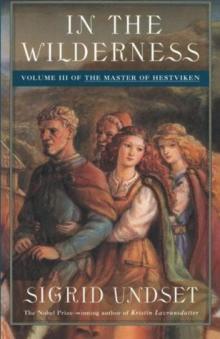 In the Wilderness
In the Wilderness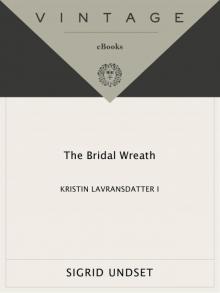 The Bridal Wreath
The Bridal Wreath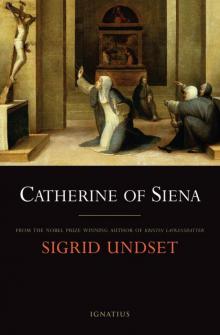 Catherine of Siena
Catherine of Siena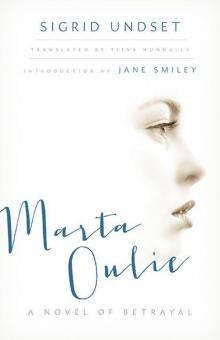 Marta Oulie: A Novel of Betrayal
Marta Oulie: A Novel of Betrayal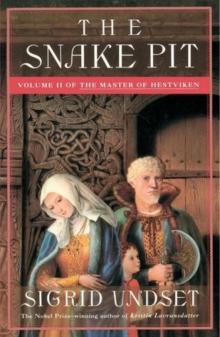 The Snake Pit
The Snake Pit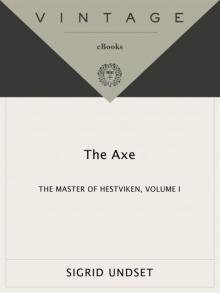 The Axe
The Axe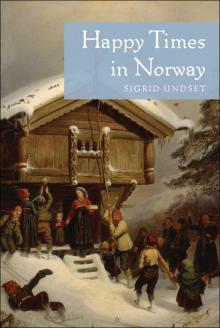 Happy Times in Norway
Happy Times in Norway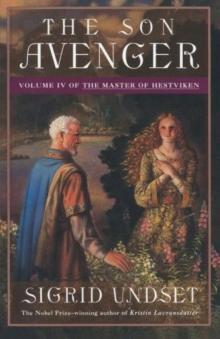 The Son Avenger
The Son Avenger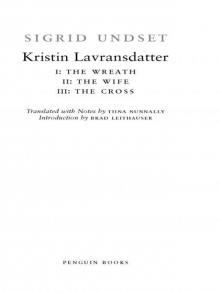 Kristin Lavransdatter
Kristin Lavransdatter